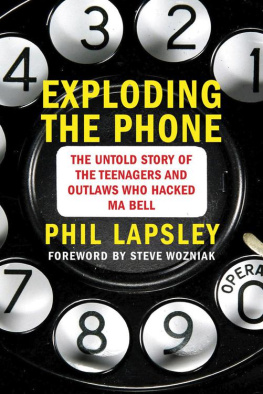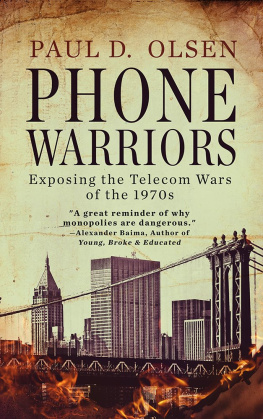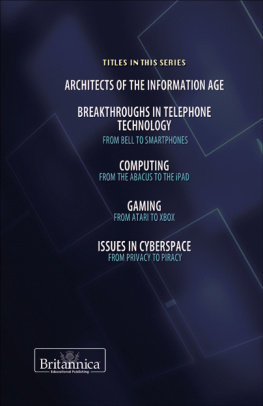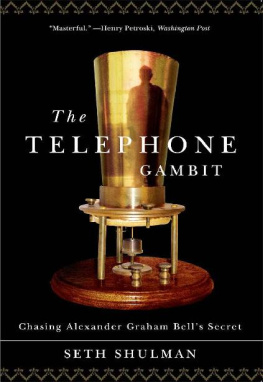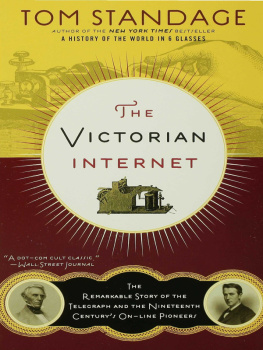
EXPLODING THE PHONE
EXPLODING THE PHONE
The Untold Story of the Teenagers
and Outlaws Who Hacked Ma Bell
PHIL LAPSLEY

Grove Press
New York
Copyright 2013 by Philip D. Lapsley
All rights reserved. No part of this book may be reproduced in any form or by any electronic or mechanical means, including information storage and retrieval systems, without permission in writing from the publisher, except by a reviewer, who may quote brief passages in a review. Scanning, uploading, and electronic distribution of this book or the facilitation of such without the permission of the publisher is prohibited. Please purchase only authorized electronic editions, and do not participate in or encourage electronic piracy of copyrighted materials. Your support of the authors rights is appreciated. Any member of educational institutions wishing to photocopy part or all of the work for classroom use, or anthology, should send inquiries to Grove/Atlantic, Inc., 841 Broadway, New York, NY 10003 or . Excerpt from IWOZ: COMPUTER GEEK TO CULT ICON: HOW I INVENTED THE PERSONAL COMPUTER, COFOUNDED APPLE, AND HAD FUN DOING IT by Steve Wozniak and Gina Smith. Copyright 2006 by Steve Wozniak and Gina Smith. Used by permission of W. W. Norton & Company, Inc.
ISBN-13: 978-0-8021-9375-9
Grove Press
an imprint of Grove/Atlantic, Inc.
841 Broadway
New York, NY 10003
Distributed by Publishers Group West
www.groveatlantic.com
13 14 15 16 10 9 8 7 6 5 4 3 2 1
To the men and women of the Bell System, and especially to the members of the technical staff of Bell Laboratories, without whom none of this would have been possible
CONTENTS
Phone phreak (n.) 1. A person who is obsessively interested in learning about, exploring, or playing with the telephone network. 2. A person who is interested in making free telephone calls.
FOREWORD
I FIRST LEARNED ABOUT phone phreaking from a magazine. In the fall of 1971 I stumbled onto an article that seemed like a bit of science fiction, about these groups of people who knew how to crack the phone system all over the world. I was young, only twenty years old, and I thought this was a really cool made up story.
I phoned Steve Jobs halfway through and started reading him the article. I just had to call him. We researched it and found out, Whoa! It made sense! Who would ever believe you could put tones into a phone and make calls free anywhere in the world? I mean, who would believe it? It was like we stumbled onto to some magical mystery that other people just didnt know about. And I had no idea the impact it would end up having on my life.
We just had to try it, to find out if it really worked. Over the next few months I started designing a blue box, an electronic gizmo that made the tones you needed to control the telephone network. I put so much attention into trying to make it the very best blue box in the world. It was digital, unlike the ones that everybody else had, and it had some of the cleverest, most off-the-wall design techniques Ive ever put into anything Ive ever built, even to this day. It was great, and it was my passport into the phone phreaks underground network.
I had grown up very shy and often felt left out of things. But for me, phone phreaking was a place in the world that I was like a leader. It was a place where I could blossom. And its not that I could blossom as a criminalit wasnt that we had lots of people to call or had giant phone bills or really wanted to rip off the phone company or anything. Its just that it was so exciting! When I went into a room and showed off phone tricks with a blue box, I was like a magician playing tricks. I was the center of attention. That was probably partly what drove me. But it was also the fascination of doing something that nobody would really believe was possible.
I was enthusiastic then about very few things, but this one I was enthusiastic about. Phone phreaking was one of the first big adventures I had in my life. And it made me want to have more of those adventures by designing more things like my blue box, weird things that worked in ways that people didnt expect. For the rest of my life, that was the reason I kept doing project after project after project, usually with Steve Jobs. You could trace it right up to the Apple II computer. It was the start of wanting to constantly design things very, very well and get noticed for it. Steve and I were a team from that day on. He once said that Apple wouldnt have existed without the blue box, and I agree.
Today a lot of people are computer hackers and a lot of them just want to cause problems for otherstheyre like vandals. I was not a vandal, I was just curious. But, boy, I wanted to find out what the limits of the telephone system were. What are the limits of any system? Ive found that for almost anybody who thinks well in digital electronics or computer programming, if you go back and look at their lives theyll have these areas of misbehavior. And I think some of the most creative people have all, at some point, focused their creativity on doing things that they arent supposed to do. But their goal is usually, oh my gosh, can I discover something? Is there some way to do something that is not exactly in books and not known? Hackers are the ultimate example: every hacker Ive ever run into is always trying to explore the little tiny nuances of anything looking for a mistake, a crack they can get through.
The blue box was this magical, unbelievable adventure. The fact that nobody else knew about it and I did made it special knowledge. But it was no good just to know it insideit was only good when I shared it with others. It was playing with magical powers. I would say I had an awful lot of those experiences in my life, but the blue box was probably the most special of all.
I hope that getting to learn a little bit about phone phreaking turns out to be one tenth as much fun for you as it was for me to experience it.
Steve Wozniak Cofounder, Apple Computer
A NOTE ON NAMES AND TENSES
A NONYMITY AND PSEUDONYMS have been a thorn in my side throughout the writing of this book. Despite my attempts to convince my interviewees that this all happened a long time ago, that the statute of limitations has long since expired, that the phone company doesnt care and the phone phreaks dont care and law enforcement doesnt care, several people have insisted on either being anonymous or being referred to by pseudonyms. For those who wished to be nameless, I have tried to make their anonymity obvious (A source familiar with the matter recalls...). Pseudonyms are marked with a footnote when they are first used to call attention to the shy. Each such footnote indicates whether the pseudonym is historical or modern, that is, whether the pseudonym used was the persons nom de phreak back in the day or is a more recent fabrication for purposes of present-day identity protection.
The identity of every source used in the book is known to me; there have been no Deep Throatstyle encounters in which I have received late-night phone calls from truly anonymous sources telling me outlandish things or, for that matter, any things at all. I guess Im just in the wrong line of work.
Finally, a note on verb tense: when I have used the present tense to attribute a quote in this book (e.g., Acker recalls or Perrin remembers), it means that the quote was taken directly from an interview I conducted between 2005 and 2012 or from a document published during that time. When I have used the past tense (The memo stated or Draper said), it indicates that the quote was taken from an older newspaper article, memo, FBI file, or other document, or from notes or audiotapes from the time in question.
Next page
